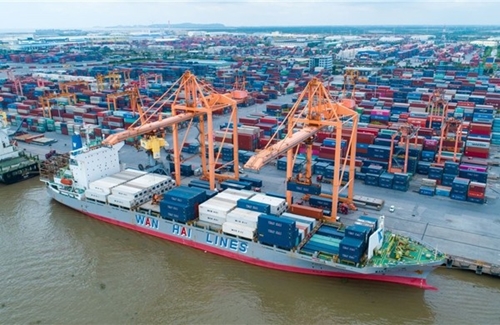This means that enterprises exporting Vietnamese goods to the U.S. market will continue to be treated differently in anti-dumping and countervailing investigations of the U.S., the actual production costs of Vietnamese enterprises will continue not to be recognized, instead, the "surrogate value" of a third country will be used to calculate dumping/subsidy margin in such cases.
    |
 |
|
A port in the Northern port city of Hai Phong |
If the DOC had examined the records and practices in Vietnam objectively and fairly, they would have been able to acknowledge the fact that Vietnam is already a market economy like the 72 other recognized market economies, including major economies such as the U.K., Canada, Mexico, Australia, Japan, India, the Republic Korea, and New Zealand, the MoIT noted.
Over the past 20 years, it went on, Vietnam's economy has undergone remarkable changes and development. Vietnam has successfully signed and put into practice 17 free trade agreements, including new-generation and high-standard free trade agreements with the E.U., the countries of the Comprehensive and Progressive Agreement for Trans-Pacific Partnership (CPTPP), and the U.K., with many extensive and comprehensive commitments from the reduction of duties to the raising of labor standards, environmental protection, sustainable development, government procurement, and transparency.
These changes have been clarified in more than 20,000 pages of information and documents sent by the MoIT to the DOC, demonstrating Vietnam's strong progress in all the six criteria set forth by the DOC when considering the graduation to a market economy.
The briefs provided by the MoIT for the DOC also fully and consistently demonstrate that Vietnam's level of implementation of these six criteria is at least equal to and generally better than the level of implementation by other countries that have been recognized as market economies; and in fact, equal to or better than countries that have always been considered as market economies. Therefore, based on the specific statutory criteria of U.S. law, the recognition of the market economy for Vietnam is an objective and fair reality, according to the MoIT.
The MoIT extended sincere thanks to 41 organizations, individuals, business associations, and trade associations in Vietnam and also the U.S. for expressing strong support for the graduation of Vietnam to a market economy, including organizations and individuals representing U.S. businesses such as the National Association of State Departments of Agriculture (NASDA), the American Chamber of Commerce (AmCham), the US-ASEAN Business Council (USABC), and the Retail Industry Leaders Association. It also said that it looks forward to the further companionship of the above-mentioned organizations and individuals in the future.
In the coming time, the MoIT will continue to study and analyse the arguments in the DOC’s report assessing the Vietnamese economy so as to continue the supplementation and completion of the briefs and relevant dossiers to submit to the DOC to request another review to recognize the market economy status of Vietnam, which will further concretize the comprehensive strategic partnership between the two countries, thereby promoting bilateral economic, trade and investment cooperation and bringing practical benefits to businesses and people of both countries.
In addition, the MoIT will always support and accompany Vietnamese enterprises exporting to the U.S. market in trade remedy investigations to ensure the highest possible benefits for the Vietnamese business community, it added.
Source: VNA